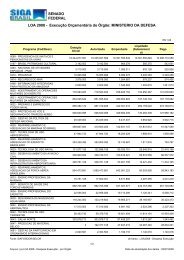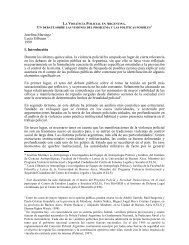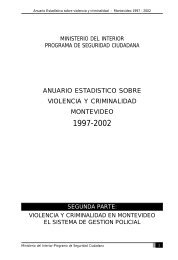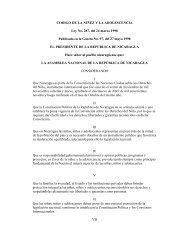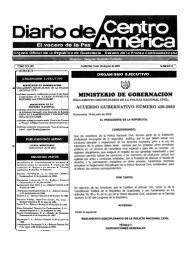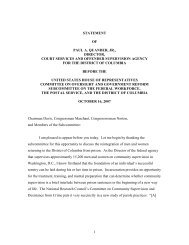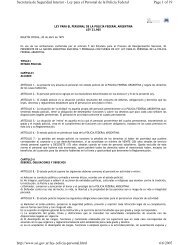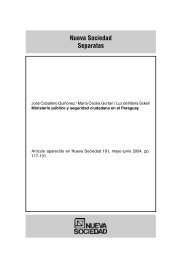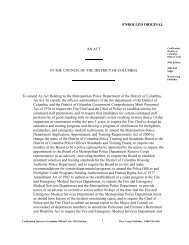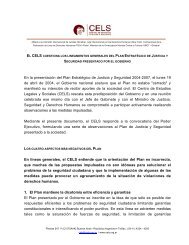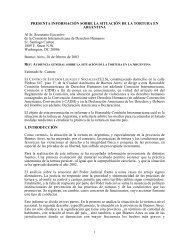Venezuela: The Life and Times of the Party System - Political ...
Venezuela: The Life and Times of the Party System - Political ...
Venezuela: The Life and Times of the Party System - Political ...
Create successful ePaper yourself
Turn your PDF publications into a flip-book with our unique Google optimized e-Paper software.
high; pervasive links to <strong>the</strong> party system gave it structure, <strong>and</strong> also helped to concentrate efforts<br />
in a limited range <strong>of</strong> arenas, especially electoral competition.<br />
Much <strong>of</strong> <strong>the</strong> success <strong>of</strong> <strong>the</strong>se agreements hinged on excluding <strong>the</strong> revolutionary Left.<br />
<strong>The</strong>ir parties were deliberately shut out <strong>of</strong> pacts <strong>and</strong> coalitions, although <strong>the</strong>y did join in<br />
consensual approval <strong>of</strong> <strong>the</strong> Constitution <strong>and</strong> were not excluded from elections until <strong>the</strong>y declared<br />
war on <strong>the</strong> system. Exclusion <strong>of</strong> <strong>the</strong> Left from pacts, coalitions, <strong>and</strong> policy-making was intended<br />
to reassure business, Church, <strong>and</strong> military leaders <strong>and</strong> reconcile <strong>the</strong>m to <strong>the</strong> new democracy.<br />
<strong>The</strong> kind <strong>of</strong> incremental change embodied in <strong>the</strong> Pact <strong>of</strong> Punto Fijo <strong>and</strong> <strong>the</strong> Minimum Program <strong>of</strong><br />
Government obviously ruled out <strong>the</strong> Left’s agenda <strong>of</strong> radical transformation. <strong>The</strong> Left also<br />
excluded itself. Frustrated by <strong>the</strong> shrinking outlook for major change at home <strong>and</strong> inspired by <strong>the</strong><br />
recent example <strong>of</strong> <strong>the</strong> Cuban Revolution, parties on <strong>the</strong> Left came to <strong>the</strong> conclusion that<br />
revolution was not only necessary but also possible for <strong>Venezuela</strong> <strong>and</strong> moved quickly to armed<br />
insurgency. <strong>The</strong> insurrection decisively consolidated <strong>the</strong> coalitions being put toge<strong>the</strong>r by AD.<br />
Military rule was still recent <strong>and</strong> discredited, <strong>and</strong> AD’s leaders played skillfully on domestic fears,<br />
painting <strong>the</strong>mselves as <strong>the</strong> only real hope for stability. <strong>The</strong>y sought <strong>and</strong> obtained US support for<br />
<strong>Venezuela</strong> as an alternative to Cuba, thus fur<strong>the</strong>r reassuring local conservatives while isolating<br />
diehard military groups who on several occasion attempted coups in <strong>the</strong> years just after 1958.<br />
At this point it is appropriate to look more closely at <strong>the</strong> nature <strong>of</strong> <strong>the</strong> major political<br />
parties. AD provided <strong>the</strong> model for political organizers that has managed to dominate <strong>the</strong> political<br />
scene for half a century, providing seven <strong>of</strong> <strong>the</strong> nine presidents elected by popular vote. Still, as<br />
we show in <strong>the</strong> next section, <strong>the</strong> party’s organization <strong>and</strong> electoral predominance decayed<br />
toge<strong>the</strong>r in <strong>the</strong> decade after 1958. Ideological <strong>and</strong> factional disputes also caused a series <strong>of</strong><br />
damaging splits (1960, 1962, 1967) which cut deeply into AD’s strength. <strong>The</strong>se were mostly<br />
repaired after 1968 as successful organizational <strong>and</strong> electoral campaigns underwrote <strong>the</strong> party’s<br />
remarkable rebound.<br />
Effective competition (especially from its tough, enduring rival COPEI) kept AD from<br />
extending its previous hegemony unchallenged to <strong>the</strong> new generations <strong>of</strong> voters now entering <strong>the</strong><br />
electorate in large numbers. COPEI was founded in 1945 as a narrowly based, sectarian<br />
opposition to <strong>the</strong> trienio regime. COPEI’s initial support was based on an appeal to politically<br />
mobilized Catholics, <strong>and</strong> voters were concentrated in <strong>the</strong> traditionally Catholic Andean states.<br />
But from <strong>the</strong>se origins, COPEI has since grown into a genuinely national <strong>and</strong> clearly<br />
nonconfessional party that competes effectively at every level.<br />
AD <strong>and</strong> COPEI have much in common. Each is a multiclass party, drawing a varied<br />
social base toge<strong>the</strong>r around a central party leadership. Of all <strong>the</strong> parties that have challenged AD<br />
for power, only COPEI has managed to build a durable <strong>and</strong> broadly popular base, drawing<br />
elements from all across <strong>the</strong> social spectrum. Both parties also have permanent pr<strong>of</strong>essional



